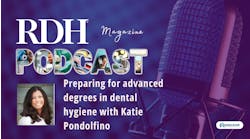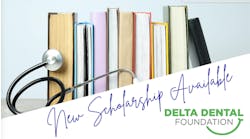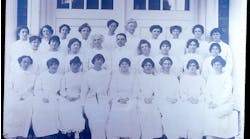by Mark Hartley
The comic strip character of Garfield was a guest of RDH in the June 2004 issue. An ensemble of SmartPractice authors talked about Garfield's venture into the movies over the summer. Several humorous illustrations of SmartPractice recall cards featuring Garfield were scattered throughout the article. The article talked about, among other things, the cartoonist's (Jim Davis) strong support of dentistry.
At the very end of the article, the authors acknowledged the assistance of Karen Baillie in preparing the article. Baillie is a health affairs writer for SmartPractice. As a veteran editor of almost 25 years, my observation is that corporate writers frequently compose words that make someone else shine. I would not be surprised to find out that Baillie was the true comic madness behind Garfield's "scaler-sharp wit" in the article.
Baillie returns in this issue, and is listed in the byline, along with Naomi Rhode, RDH, the co-founder of SmartPractice and a former RDH board member. If you decide to read the article, first go to the biographical information about the authors at the end of the article. It says, "Karen was diagnosed with breast cancer in 1998 and is a six-year survivor."
Karen has never talked with me about her experience - no reason why she would. One of my wife's friends has been through the ordeal, too. We don't talk about it either, but I overhear enough to know that she is also a determined survivor. In fact, if we could just shorten the telephone conversations between her and my wife from hours to minutes, everything would be hunky-dory in my world.
My world has always regarded breast cancer as a distant news story.
Then along came Baillie's article, which she prepared specifically for this issue (October is National Breast Cancer Awareness Month). You can tell that breast cancer is an important issue for Baillie and Rhode; this ain't the comics anymore.
I know two of the three hygienists they interviewed for the article. As a result, the disease got a little more personal. And the stories of three of your peers bouncing back from the diagnosis and treatment of breast cancer should be a little personal to you too. Two statements made by the hygienists struck a chord with me:
The first was: "I found that taking a patient's medical history opens the door for discussion about the last time a woman had a mammogram or breast examination. When I share my experience, I suggest that women practice prevention with respect not only to oral health, but also to breast health."
The second statement was: "I've also shared my experience with some of my patients. It feels good to tell people I'm a cancer survivor, and it's hard for me to hear people complain about little things. For my own health, I no longer absorb all the patients' tensions."
Baillie and Rhode compile a list of related Web sites (on page 28), and I looked through some of them. One site not on the list - but that I found interesting - was www.sisterstudy.org. Sisters of breast cancer patients are twice as likely to get the disease as other women. The study targets "healthy" siblings as a great way to obtain more information about the environmental factors behind the disease.
The name of Y-Me National Breast Cancer Organization was eye-catching, so I wandered around that site too. Since my youngest son has diminished my collection of ties through excessive wear at retail jobs, I bought the navy blue one in the photo from the Y-Me organization.
Surviving breast cancer is still a tough road, but detection methods and prevention help level the odds. One hygienist from the article noted, though, "Friends, family, and co-workers were supportive. However, I did find, surprisingly, that many of them equate breast cancer with death. I had to re-educate them about the disease."
That's not good. And I certainly hope dental hygienists do not need to be re-educated when patients show up at the dental office while in some stage of breast cancer treatment or remission. These organizations do a great job in providing information - take advantage of the Web sites. I thank Karen and Naomi for educating us about an uncommon perspective of the disease in dental hygiene.
Mark Hartley is the editor of RDH. He can be contacted at [email protected]





